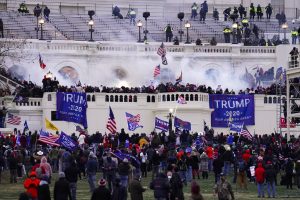The storming of the United States Capitol on January 6 by Trump-backed insurrectionists marks a signal moment in modern American history. The symbolic weight – in terms of laying bare the country’s deep fragility – of what can only be described as a direct assault on American democracy is comparable to the terrorist attacks in New York and Washington, D.C. almost twenty years ago. If 9/11 exposed the United States’ physical vulnerability, events that transpired during the course of the day yesterday show how even the most hallowed of institutions and political rituals can be shaken by assorted reprobates in the thrall of a cocksure demagogue.
Just like the destruction of the twin towers in New York City in September 2001, the events of January 6 will have lasting and unpredictable consequences for U.S. foreign policy which, despite its episodic turn to realpolitik lite, has pivoted around authority derived, in equal measure, from American power and principles. If power is what ultimately did the trick in imposing the United States’ will halfway across the world, the self-perpetuated yet comforting myth of American exceptionalism and the intrinsic weight of its form of government is what allowed the U.S. to do what it did around the world during the Cold War and the years after.
The legitimacy that U.S. political institutions, by and large unperturbed by extra-democratic forces, conferred on presidents gave them the ability to hector and coerce other governments when these governments were found in breach of what the U.S. considered the inalienable rights of foreign polities. No more; the moment tear gas shells were fired in the Capitol rotunda, the United States lost a significant fraction of the moral capital needed to shape the world in its own image.
Images of cosplay clowns desecrating the most sacred of U.S. institutions – the house of the people – after being incited to do so by a sitting American president will, for a long time to come, serve as shield and sword for every two-bit authoritarian leader across Asia and the rest of the world. Every time the U.S. would seek to bring a Xi or Duterte or Bolsonaro into line, strongmen will retort with descriptions of how Trump’s militia literally brought American lawmakers to their knees as they sought to uphold the people’s will.
That the road from here on will be challenging for President-elect Joe Biden in the course of the next four years is an understatement. Almost twenty years later, the United States will once more have to begin the process of nation-building; but this time around, it will be a project at home rather than in the badlands of South or West Asia. While the immediate task ahead of the U.S. political class and establishment is simple and cuts across the bipartisan divide, namely, to prevent Trump from doing further damage in the 13 days that remain until Biden’s inauguration, it is when Biden enters the Oval Office on January 20 that he would face his greatest political challenge, which will be to restore American credibility abroad and clean up the festering mess in his backyard. For the first time in recent American history, foreign policy will have to start at home, a task as simple to state as it is onerous.

































